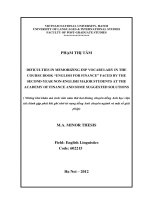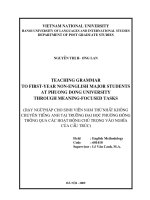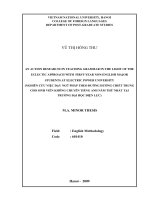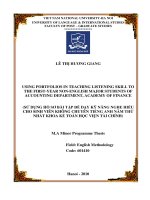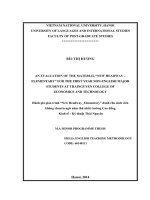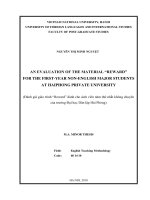Improving the first year non english majors pronunciation at an giang university using games
Bạn đang xem bản rút gọn của tài liệu. Xem và tải ngay bản đầy đủ của tài liệu tại đây (1.09 MB, 119 trang )
VIETNAM NATIONAL UNIVERSITY - HO CHI MINH CITY
UNIVERSITY OF SOCIAL SCIENCES AND HUMANITIES
WX
NGUYỄN THỊ ÁNH NGUYỆT
IMPROVING THE FIRST YEAR
NON-ENGLISH MAJORS’ PRONUNCIATION
AT AN GIANG UNIVERSITY USING GAMES
M.A. THESIS
SUBMITTED IN PARTIAL FULFILLMENT
OF THE REQUIREMENTS FOR THE DEGREE
OF MASTER OF ARTS IN TESOL
Supervisor: PETER LEONARD, M.A.
Ho Chi Minh City, October 2007
CERTIFICATE OF ORIGINALITY
Except those cited in the bibliography, this thesis contains no other publications
elsewhere. Besides, no other person’s work has been used without the
acknowledgement in the writing.
Therefore, I certify my authority of the thesis submitted now entitled:
IMPROVING PRONUNCIATION OF THE FIRST YEAR NONENGLISH MAJORED STUDENTS AT AN GIANG UNIVERSITY
USING GAMES
This thesis has been handed in for the requirements of the Master’s Program at
the University of Social Sciences and Humanities issued by the Higher Degree
Committee.
Ho Chi Minh City, 2007
NGUYỄN THỊ ÁNH NGUYỆT
i
RETENTION AND USE OF THE THESIS
I hereby state that I, NGUYỄN THỊ ÁNH NGUYỆT, the post-graduate of the
Master of TESOL at the University of Social Science and Humanity, accept the
requirements of the school for the retention and use of Master’s Theses deposited in
the library.
In terms of these conditions, I agree that the original of my thesis deposited in
the library should be helpful for the purpose of study and research to the students at
the school, meeting the regulations of the library for the care, loan and reproduction
of the thesis.
Ho Chi Minh City, 2007
NGUYỄN THỊ ÁNH NGUYỆT
ii
ACKNOWLEDGEMENT
I would like to express my deep gratitude to:
- Mr. Peter Leonard, M.A., my supervisor and instructor at the Faculty of English
Linguistics and Literature, the University of Social Sciences and Humanities for his
untiring and useful assistance to me throughout the process of my writing. His
encouragement and approval have also helped me a lot to overcome troubles in
doing the research, without which I am not able to complete this study well.
- Mr. Nguyễn Hoàng Linh, my teacher at the University of Social Sciences and
Humanities for his useful suggestions on my thesis proposal.
- Ms. Vương Thị Mỹ Tâm, the Dean of English Faculty, Education Department at
An Giang University for her sympathy during the time I did the research there.
- All of my colleagues and students at An Giang University for their considerable
helps so that I could finish the thesis well.
- My family, especially my husband, gave me opportunities and free time to write
and to do research. They were always by my side to support me whenever I was
stuck.
iii
ABSTRACT
This thesis examines the role of games in improving the pronunciation ability of
the first year English non-majors at An Giang University.
The thesis was carried out as follows: (1) a questionnaire delivered to students
to see how much they were interested in games and to know about their selfrecognition of pronunciation as well as its problems. (2) a tape recording of the prespeaking test at the beginning of the semester to investigate common problems
students made in order to have appropriate games during the semester; and to count
how many mistakes they had in answering some given questions. (3) a series of
class observations at An Giang University to take notes of common mistakes
students had and how the teachers reacted to the problem. (4) a tape recording of the
post-speaking test to measure the improvement in pronunciation after they had
joined games in classes.
Conclusions were made on analyzing the results of the above steps. Thanks to
them, there were also some suggestions for better teaching and learning English at
the University.
The investigation reveals that games affected the first year non-English majors’
pronunciation ability at An Giang University a lot. Games, in fact, not only helped
learners there become more accurate in speaking and pronouncing English words,
but also gave them chances to study in an amusing and interesting atmosphere.
Besides, class observations show that they became more independent in studying
and friendlier to other people. They were also more active, creative and cooperative
in solving problems and were more willing to do tasks assigned by teachers.
The study also suggests some pedagogical implications in teaching and learning
English there. Teachers should give their students more chances to play games in
classes because games both help them to relax and are good means of practicing and
reviewing the old lessons. Students should make use of chances in classes to
practice speaking because this is the safe and unique environment for them to learn
and practice what they learnt.
iv
TABLE OF CONTENTS
TABLE OF CONTENTS
Chapter1: INTRODUCTION .............................................................................1
1.1. Reasons for choosing the topic ....................................................................1
1.2. Aims of the study.........................................................................................3
1.3. Scope of the study .......................................................................................4
1.4. Research questions ......................................................................................5
1.5. Significance of the study .............................................................................5
1.6. Overview of thesis chapters.........................................................................6
Chapter 2: LITERATURE REVIEW ...............................................................7
2.1. Teaching Pronunciation ..............................................................................7
Problems leading to mispronunciation ..............................................................9
2.2. What is a game and why do teachers use games in the classroom? .........14
2.3. Theories about games ...............................................................................17
2.3.1. Types of games .................................................................................17
2.3.2. Communicative approach ..................................................................21
2.4. The use of games in teaching pronunciation ............................................29
Some practical considerations .........................................................................33
Conclusion .......................................................................................................36
Chapter 3: OVERVIEW OF PRESENT TEACHING AND LEARNING AT
AN GIANG UNIVERSITY ...................................................................................38
3.1. Introduction ...............................................................................................38
3.2. Description of the teaching staff and teaching methodologies .................39
3.3. Non-English major’s program ..................................................................40
3.4. Description of the students in researched class ........................................41
3.5. The description of Know How series .......................................................43
3.6. Teaching pronunciation in Know How material through speaking through
communicative and student-centeredness’ approaches ............................................45
v
Chapter 4: METHODOLOGY .........................................................................49
4.1. Methodology of data collection ................................................................49
Obstacles ..........................................................................................................49
4.2. Tape recording ..........................................................................................50
4.3. Questionnaire ............................................................................................51
4.4. Class observation ......................................................................................51
4.5. Oral tests ...................................................................................................52
CHAPTER 5: RESULTS AND DISCUSSIONS .............................................53
5.1. Results of the tape recording in the pre-test ..............................................53
5.2. Questionnaire.............................................................................................57
5.3. Results of observations ..............................................................................75
5.3.1. Kinds of mispronunciation that the students made ............................75
5.3.2. How the teacher reacted to the problem.............................................78
5.3.3. Which skills were paid the most attention to during the class? .........80
5.3.4. Did the teacher use the games in the class? .......................................81
5.4. Results of oral tests....................................................................................82
5.5. Findings .....................................................................................................84
CHAPTER 6: CONCLUSION ..........................................................................86
6.1. Conclusion and suggestions.......................................................................86
6.2. Delimitation and Limitation ......................................................................87
6.3. Pedagogical implications ...........................................................................90
BIBLIOGRAPHY..............................................................................................91
Appendices .........................................................................................................94
Appendix A .........................................................................................................94
Appendix B .......................................................................................................104
Appendix C .......................................................................................................108
vi
CHAPTER ONE: INTRODUCTION
1.1.
Reasons for choosing the topic
The development of the Vietnamese economy requires Vietnamese people to
know English in order to work with foreigners. To meet the higher demands of
society, many people equip themselves with a stable knowledge of English to
communicate with their foreign counterparts or to read materials in English for their
own business. To make a good preparation for the young generation, English,
therefore, becomes a must in many teaching and learning courses especially at the
university level.
Without exception, all students at An Giang University must study English for at
least five semesters. Doing this, the administration board hopes to give them basic
knowledge of English for survival in the future. However, teaching English at An
Giang University has, so far, just aimed to equip students with knowledge of
grammar, vocabulary, reading and writing skills. Most people think that good
knowledge of grammar and vocabulary will pave the way for other skills to
develop. Because of such a perception, speaking was not much focused on in
teaching and not tested in the examination. Pronunciation, as a result, was almost
ignored in classes.
Nevertheless, in reality, knowing English does not mean knowing how to say
something in English, but knowing how to say it appropriately and correctly. After
some years of observing and testing, school administrators have found out that
knowing grammar and vocabulary only was not enough. Students must be trained to
be able to express their ideas fluently and accurately in English. Since then,
speaking has been taken into consideration. Pronunciation, however, is still not paid
much attention to and is not taught carefully enough in classes.
There are three main reasons why teachers do not focus much on pronunciation
when teaching non-English majors there.
1
Firstly, pronunciation is not a separate subject. It is just one of many factors
such as accuracy and fluency contributing to good speaking skills. Students, in fact,
can pass the oral exam at the end of the semester without good and exact
pronunciation.
Secondly, some teachers are not very proficient at pronunciation. Clearly, not
many teachers are specially trained to be pronunciation teachers. Even the teachers
themselves sometimes mispronounce common sounds. Therefore, they usually
avoid teaching them in order not to waste time for preparing and practicing or even
not to be looked down on by their students.
Finally, the teachers’ and students’ prejudice may prevent them from teaching
and learning pronunciation. Teachers may hold the view that correct pronunciation
is not very essential for these non-English majors. That they just need to know how
to say what they think is enough. They can also communicate successfully without
pronouncing correctly. For the students, pronunciation may be boring and difficult
to study because they do not know much about it. In fact, only a few of them have
opportunities to work with pronunciation in high school. Therefore, it must be very
boring, tiring and stressful to study. As a result, not much time is devoted to
teaching and learning pronunciation.
Whatever the reason, the failure to teach and learn pronunciation may prevent
speakers from expressing their thoughts clearly and exactly. That can lead to
misunderstanding among interlocutors.
As a teacher at An Giang University, I think that the situation must be changed
if we want our students to be effective communicators. After some years of teaching
and observing my colleagues’ teaching, I have noticed how enthusiastic students are
about learning and practicing English by means of games. I, therefore, do believe
that games are not only fun but also help them to acquire English without much
conscious analysis or understanding of the learning process.
2
With the purpose to contribute a little bit to the process of building and
developing my university, a very young one, and to improve An Giang University
students’ pronunciation ability, I have spent much time researching and collecting
pronunciation games. I think that games can improve learners’ pronunciation in a
fun and interesting way. On doing the research, I hope to confirm my idea and to
give some implications for teaching English to these university students.
1.2.
Aims of the study
In learning a foreign language, especially English, Vietnamese learners have to
face many difficulties in pronunciation. These problems come from the different
sound systems of the two languages. They can be strange consonants, vowels or
consonant clusters, which are different from or do not exist in the Vietnamese
language.
As freshmen, An Giang students study English with Know How materials, the
elementary level. There are only a few explanations, but no exercises related to
pronunciation in this material series. Like other students, students there make many
mispronunciations when studying English.
Improving students’ pronunciation has been my desire since I became a teacher
at An Giang University. Therefore, during my teaching and learning time, I have
paid much attention to finding out solutions for the problem and finally arrived at
games as the best solution.
The purpose of the thesis, then, is to investigate how efficient the games are in
improving learners’ pronunciation. On analyzing the roles of games in
pronunciation improvement, I also hope to put for some suggestions for teaching
and learning English at An Giang University.
3
1.3.
Scope of the study
The population of my study will be the first year non-English majors at An
Giang University. The sample is six classes comprising about two hundred and fifty
students.
I chose six classes as the sample of my study for the following reasons. Firstly,
there are four departments in An Giang University: education, economics,
agriculture and information technology with one thousand two hundred and forty
students in thirty-two classes. In such a limited time and ability, I could not make an
extensive research with all of them. Secondly, I am just allowed to teach at most six
classes in a year (two semesters). I cannot do research in the classes I do not teach.
Besides, the first year non-English majors are chosen as the sample of the study
because they are of the same generation. Their feelings and reactions to problems
may be similar. Besides, equipping them with good knowledge of pronunciation at
this early time will be very helpful for improving their listening and speaking skills
in the future.
Pronunciation, as previously mentioned, is not a separate subject but a factor of
speaking skills. However, in order to have a thorough study carefully and
successfully, my research focuses wholly on pronunciation in teaching speaking.
The findings of the study will be based on the data collected from interviews,
observations, questionnaires and mainly from analyzing the tape recording and the
final oral test.
In my thesis, Know How is chosen as the main tool to carry out the research
because it is the unique material that students there use. However, there are few
pronunciation activities and no games in this material. Therefore, most of the games
I use are collected from different books. For different lessons with different
problems, there may be similar games applied.
4
1.4.
Research questions
In this study, the following questions are going to be answered
1.
Which problems may students at An Giang University face in
pronouncing English?
2.
To what extent can games improve learner’s pronunciation?
1.5.
Significance of the study
The study meets the new requirement of teaching and learning languages in the
world as well as in Vietnam. That is studying English for real life communication,
not for reading and writing only.
Through examining the role of games in improving the first year non-English
major’s pronunciation ability at An Giang University, teachers can have a clearer
view of games and their roles in teaching and learning a foreign language. From
that, they can know how much they should use games in classes and use them for
what purposes in order to improve the quality of teaching and learning English
there.
The study also serves as a useful resource for further research in related fields.
1.6.
Overview of thesis chapters
There are six chapters in this study
Chapter one introduces the importance of pronunciation and reasons for
improving it in learners of English at An Giang University. Besides, there are
reasons why the research is carried out in such a population.
Chapter two tells about the theoretical background of games in teaching foreign
languages especially English. It also reviews the literature of some topics related in
the study.
5
Chapter three gives a full description of present teaching and learning at An
Giang University, the English faculty using English in the Know How material
through communicative and student-centeredness approach.
Chapter four presents methodologies used during the study. It also includes
obstacles happening during the process of carrying the thesis out.
Chapter five includes data collected from the questionnaires of students in six
classes and data from the recording of the pre-test and the post-test to analyze
student’s speaking ability. Besides, there is an analysis of the class observation. It
also reports findings from the data collected from these activities. The result of
findings will be discussed carefully to see how games can improve learner’s
pronunciation through speaking activities.
Chapter six ends the study with the conclusion of the effectiveness of games in
improving learner’s pronunciation. From what has just been found out, there are
also some pedagogical implications for teaching pronunciation. It also points out
some limitations of the study.
6
CHAPTER TWO: LITERATURE REVIEW
In this chapter, some theories that support the content of the thesis will be
discussed.
2.1. Teaching Pronunciation
Whenever talking about pronunciation, people usually think of the sound
system: IPA (International Phonetics Alphabet) which shows learners how to
pronounce each letter appropriately in each different situation. However,
pronunciation, in fact, is more than just the sound but stress, patterns and intonation.
Each component plays a different important role in pronouncing correctly.
Nevertheless, it is always the fact that the sound system is the first and most
important factor learners must know about when starting learning a foreign
language because only by pronouncing the word correctly can they make good
speech with correct patterns and intonations.
Within the limitation of this writing pronunciation is used as that of the sound
system only.
As mentioned at the beginning, pronunciation is not a separated skill but one of
many components, which contributes to good speaking skills. For that reason,
pronunciation is not carefully taught to learners of English especially the nonEnglish majors at the university. People think that skills are more important than
components. That is a quite wrong perception, however. Bad pronunciation, indeed,
may lead to many troubles in learning and using English. Hinofotis and Baily
(1980:124_5) reported “up to a certain proficiency standard, the fault which most
severely impairs the communication process in EFL/ ESL (1) learners is
pronunciation, rather than vocabulary or grammar.” Their arguments make
pronunciation instruction all more important in improving the communicative
competence of language learners.
1
EFL/ ESL: English as a foreign language/ English as a second language
7
This argument meets the sympathy of Celce-Murcia, Brinton and Goodwin
(1990: 232) about the importance of pronunciation. “Teachers should call attention
to the possible stigmatizing effect that this may have-that is the native speakers may
conclude that the non-native speaker does not “know” English grammar and thus
may arrive at a false conclusion about this speaker’s proficiency in English.”
In fact, when speakers make a lot of mistakes in pronunciation, especially in
grammar, listeners will get tired of listening to them and may think that they are the
worst learners of grammar in the world.
Õ For example:
1. I wait for you here yesterday.
For “I waited for you here yesterday.”
2. “There are three pen on the table.”
For “There are three pens on the table.”
These grammar points are simple and very easy for students to write down but
are troublesome to utter. Therefore, instead of being good at grammar, they are still
considered bad because of incorrect pronunciation.
It is obvious that when learning a language, learners cannot study only what the
words mean and how to combine them together to make grammatical sentences. By
contrast, they must also learn when and how to use these sentences appropriately in
each situation to achieve the communicative purpose. Besides, they must utter these
sentences clearly and correctly in order not to make the others mishear which may
lead to misunderstanding of what they want to express.
Seeing the importance of pronunciation, as a language teacher, the researcher
believes that more time and energy should be devoted to teaching and learning
English pronunciation.
8
As people said, however, that “pronunciation is the aspect of language that most
adult learners of English (and other languages) most need, and want to master – yet
it is also the aspect that most English teachers find themselves least able to teach
effectively. This situation is of concern, since it means that many language students
do not acquire the speaking skills they need.”
( />English pronunciation, clearly, is not easy for Vietnamese learners to obtain
because of the following problems.
* Problems leading to mispronunciation
The first problem may come from Finegan’s point of view (1994:25) “Some
what less obvious perhaps is the numbers of sounds that occur in the words do not
have an exact correspondence between numbers of sounds and numbers of letters.
This lack of correspondence is common in English.”
Õ For example:
change / ʧændʒ /
street / stri:t /
box / bɒks /
In fact, within one language, some sounds correspond to more than one letter or
some letters correspond to more than one sound. Besides, a single letter can be used
to represent different sounds in different languages.
Õ For example:
son /sʌn/
sun /sʌn/
9
Or
hat / hæt /
gave / geiv /
care /ker /
cargo / ‘ka:gəυ / (2)
The differences are best shown in the English language compared with
Vietnamese. It was carefully discussed in Nguyen Vu Phuong’s M.A. Thesis about
the similarities and differences between Vietnamese and English vowels in 2006.
Clearly, Vietnamese is a simple language in which each letter represents a different
sound. Vietnamese people, therefore, usually base on the letter to pronounce the
word. By contrast, they must know in what context how an English single sound is
pronounced. This causes many troubles for Vietnamese learners when uttering
English.
Avery and Ehrlich (1995: 7) argue, “The lack of sound-spelling correspondence
in English words means that there are no sound-spelling regularities in English. In
fact, many of the consonant letters display an inconsistent relationship to the sounds
they represent.”
The second problem may derive from the language system. To Avery and
Ehrlich (1995: 7), there are 24 consonants and 20 vowels and diphthongs in English.
By contrast, there are only 22 consonants and 14 vowels and diphthongs in
Vietnamese. (Đinh Lê Thư and Nguyễn Văn Huệ, 1989)
It is clear that the Vietnamese sound system lacks some of the sounds that exist
in English. Besides, there may not be some correspondent sounds between the two
languages. These obstacles may prevent Vietnamese learners from uttering correctly
English sounds.
2
The Oxford Modern English Dictionary
10
Õ For example:
Letter
Vietnamese pronunciation
English pronunciation
ch
/ç/
/ t∫ /
a
/α/
/ æ, a, ә, ɒ, etc /
e
/e/
/ i:, ә, etc./
i
/i/
/ ai, i, etc./
th
/ th /
/ θ, δ /
g
/γ/
/g/
sh
/ none /
/∫/
s
/ş/
/ s, z /
Lado (1957, 2) argues “The student who comes in contact with a foreign
language will find some features of it quite easy and other extremely difficult.
These elements that are similar to his native language will be simple for him and
those that are different will be difficult.”
Õ For example:
easy to pronounce
difficult to pronounce
tree
three
treat
street
ring
spring
Ben
pen
pen
pens
That is also what Burns and Joyce (1997: 130) say “The linguistic fact that
inhibits the use of spoken language includes difficulties in transferring from the first
11
language to sounds, rhythms and stress patterns of English… and how these may be
different from their own language.”
Mentioning about pronunciation problems, in addition, the researchers must not
forget the language itself. While English is an inflectional language, Vietnamese is
a monosyllabic and non-inflecting one. “Vietnamese has no inflections,
differentiates words by tones and make great use of syntax and particles for
grammatical purposes. Therefore, Vietnamese learners find a language like English
which is so dissimilar to their own, very difficult to learn.”(Swan and Smith, 1991)
“Among inflectional features, the past tense and the plural form are the most
common features which cause many troubles for foreign learners of English. They
may find it extremely difficult to utter another sound after the entire word. As a
result, they often delete these features. That may lead to a change in meaning or
cause unpleasantness to hearers.” (Lado, 1957)
It is the fact that in English, the word itself can be changed to have different
meanings in different contexts while Vietnamese cannot.
Õ For example:
English
Vietnamese
1. I love him.
1. Tôi yêu anh ấy.
I loved him last year.
Năm ngoái tôi yêu anh ấy
I have loved him for 5 years.
Tôi đã yêu anh ấy khoảng 5 năm.
2. There is one student here.
2. Có một học sinh ở đây.
There are ten students here.
Có mười học sinh ở đây.
In short, students from a quite different language system may find it very
difficult to learn and pronounce English.
12
Besides, one of the very important reasons why learners cannot acquire basic
speaking competence is the misconception of learning pronunciation. They think the
purpose of learning pronunciation is
1.
to locate the vowel that is pronounced with a primary stress in a given
word and to locate the word with a major stress in a given sentence.
2.
to distinguish the individual vowel and consonant sounds or phonemes. In
fact, in all of their English exams, they have to do the pronunciation test in
the written form. Therefore, what they need to know is separate sound,
stress, and pattern so as to get higher marks in the pronunciation sections
of any exams.(Lado, 1957)
That is exactly similar to what An Giang students have been doing. They just try
to study what they are going to deal with in the final exam no matter how they
understand the lesson and what they may be in the future. As a result, pronouncing
English well or not is not the matter of consideration.
Doff (1988:113) states “pronunciation problems will, of course, vary greatly
from one country to another. Common problems are likely to occur
-
Difficulty in pronouncing sounds which do not exist in the student’s own
language.
-
Confusion of similar sounds eg. / i: / vs. / I /; /p/ vs. /b/; /δ/ vs. /θ/; etc.
-
Use of simple vowels instead of diphthongs eg. /ɒ/ vs. /әυ/
-
Difficulty in pronouncing consonant clusters eg. play, street, opens
-
Tendency to give all syllables equal stress, and a “flat” intonation.”
To sum up, in order to have perfect pronunciation classes, to Celce-Murcia,
Brinton, and Goodwin (1996: 324), the following matters should be the matter of
account.
13
1.
“Is the student’s first language stressed-timed or syllable- timed? Students
from a syllable timed language background will no doubt have difficulty
in assigning greater length of function words and all unstressed syllables
of contents words within a sentence. (In fact, Vietnamese is a stressedtimed language while English is a syllable-timed one.)
2.
Is the universal syllable structure in the student’s first language closed or
open? Students who come from language background with a
predominantly open syllable structure like Vietnamese will tend to have
difficulty with syllable-final consonants, which are very common in
English.
3.
Is the student’s first language tonal or intonational? Students from tonal
languages may experience difficulty sustaining intonation contours over
large stretches of discourse.
4.
Are there subtle differences in the voice onset time of consonant such that
what sound like /p/ in English speakers, is /b/ to Vietnames?”
With the above-diversified troubles Vietnamese learners may face when
studying English as well as their own perspectives that learning pronunciation is not
important, it is strongly believed that in order to equip students with a good
knowledge of English pronunciation, there must be much effort and many
outstanding methods to help both teachers and learners overcome the obstacles.
It is true that there are various ways to improve Vietnamese learners’
pronunciation of English. Among them, games are chosen as one of the best
solutions. Within the thesis, therefore, I would like to invest all my time and energy
to find out how effective games are in solving the problem.
However, how to use the right game in a particular situation must be a big
problem because games, of course, must be matched to students’ reactions and
responses. The followings are some of the theories of the matter.
14
2.2. What is a game and why do teachers use games in the classroom?
In recent teaching and learning theories, studying a foreign language does not
simply mean the process of memorizing but acquiring. And then, games are widely
used and accepted as a useful technique to help students acquire the language by
many teachers and methodologists. The term “game” has been used and discussed
about much so far. Following are some of the typical definitions.
To Greenall (1990:6), “The term “game” is used whenever there is an element of
competition between individual students or teams in a language activity.”
Lee (1991:3) argues, “Games in the strict sense, which have a definite beginning
and end, are governed by rules…”
That is quite similar to Haldfield’s definition (1999,V) “A game is an activity
with rules, a goal and an element of fun…. Games should be regarded as an integral
part of the language syllabus, not as an amusing activity for Friday afternoon or for
the end of the term.”
In his opinion, “Games can be used at all stages of the progression from
controlled to free practice, serving at one end of the range as a memory aid and
repetition drill, at the other as a chance to use the language freely and as a means to
an end rather than an end in itself. They can also serve as a diagnostic tool for the
teacher, who can note areas of difficulty and take appropriate remedial action.”
Therefore, games can be used to practice the structures and help students overcome
difficulties with drills or group working.
Games, besides, are also a good means to entertain students after a long time of
concentrating on the lesson. “Few students can concentrate for long periods without
some changes of pace, and even fewer will actually benefit from learning in such an
intensive way in the long run.”(Greenall, 1990)
Games, in fact, give players amusing feelings, which not only encourage them to
take part in but also give them chances to acquire the new language. Carrier (1980:
15
5) says “Games provide quite extensive language practice opportunities for both
general and specific language skills.” In fact, we can use different kinds of games to
improve students’ skills.
When participating in games, students usually forget all their troubles and use
the language freely and excitedly because they know that the teacher does not
correct most of their mistakes. Besides, their friends will not look down them if they
make or say something wrong. It is really a safe environment for them to practice
what they have just learned in theories. Thanks to this, students themselves can
realize what they have understood or whether they should study more about the
lesson.
With such above advantages, games should be used regularly in classes to help
students obtain the new language in the process of learning.
Haldfield (1990, VII) states “The inclusion of games as an integral part of any
language syllabus provides an opportunity for intensive language practice, offer a
context in which language is used meaningfully and as a means to an end, and acts
as a diagnostic tool for the teacher, highlighting areas of difficulty. Last but
certainly not least, one of the most important reasons for using games is simply that
they are immensely enjoyable for both teachers and learners.”
To meet the new demands of the society, therefore, teachers should provide the
students their own chances for practicing using the language meaningfully in
rehearsal contexts as soon as possible if they want them to learn effectively.
To Greenall (1990:6) “The language teacher has to encourage this transition to
the production or free stage by simulating the real-life situations which occur
outside the classroom. Language activities and games are one of the good ways for
the teacher to achieve this aim.”
With the above advantages and necessities of using games, I do think that
teachers should use games often in the class.
16
2.3. Theories about games
2.3.1. Types of games
Haldfield (1990:8) classifies games into two types “linguistic games” and
“communicative games”. “In linguistic games, the goal of the game is linguistic
accuracy i.e. producing a correct structure. Communicative games, however, are
activities with a goal or aim that is not linguistics. They are activities for the
students to do such things as drawing a route, filling in a chart or finding two
matching pictures, rather than the correct production of a structure. The emphasis in
linguistic games, therefore, is on accuracy, in communicative games, the emphasis
falls on fluency, on successful communication rather than correctness of language.”
Due to their own characteristics, pronunciation games are mainly communicative
ones. Only through speaking can the teacher realize whether his/her students
pronounce correctly.
To Haldfield, the two above types of games can be categorized into two kinds:
“competitive games”, in which players or teams race to be the first to reach the
goal, and “cooperative games”, in which players or teams work together towards a
common goal. Both types of games can be used regularly in turn in classrooms in
order to avoid boredom. However, competitive games are more preferable because
it creates a competing atmosphere among the students so they try to do it faster and
better.
Games are not the means, however, for any kind of teaching activities. Haldfield
(1990:8) says “The games have been designed to practice the language studied, but
not to introduce the language.”
Greenall (1990:5) also confirms that “Drama, role-play, simulation, games are
commonly used in the classroom to allow students to practice the language they are
learning….They are for teachers who are interested in giving lively and motivating
lessons and in creating the opportunities for spontaneous, authentic language
17
practice in the classroom. They refer to any activity which is used to consolidate
language already taught or acquired.”
However, the game itself is not as interesting and exciting as we think. In order
to make them a fun and exciting means of education, a variety of techniques must
be taken into consideration.
Haldfield (1990, 8) says “The games make use of a variety of techniques.
Variety is important in language teaching, and a succession of games based on the
same principles, though exciting and novel at first, would soon become boring.”
Carrier (1980: 3) absolutely agrees “Although games should be used regularly,
this ought not to become a meaningless habit such as playing “Hangman” every
Friday afternoon. The element of surprise and variety should be carefully
maintained.”
Games, in short, are not always interesting. The role of the teacher is, therefore,
to make use of techniques to carry them out excitedly.
Haldfield (1990, 8) said that games can take one of the following forms
1.
Information gap: Students ask their partners to get missing information
to complete the task or card they have or together solve a problem.
2.
Guessing games: The player with the information deliberately withholds
it, while others guess what it may be.
3.
Search games: Players must obtain all or a large amount of the
information available to fill in a questionnaire or to solve a problem.
4.
Matching games: These games involve matching corresponding pairs of
cards or pictures. Everyone must find a partner with a corresponding card
or picture.
18



